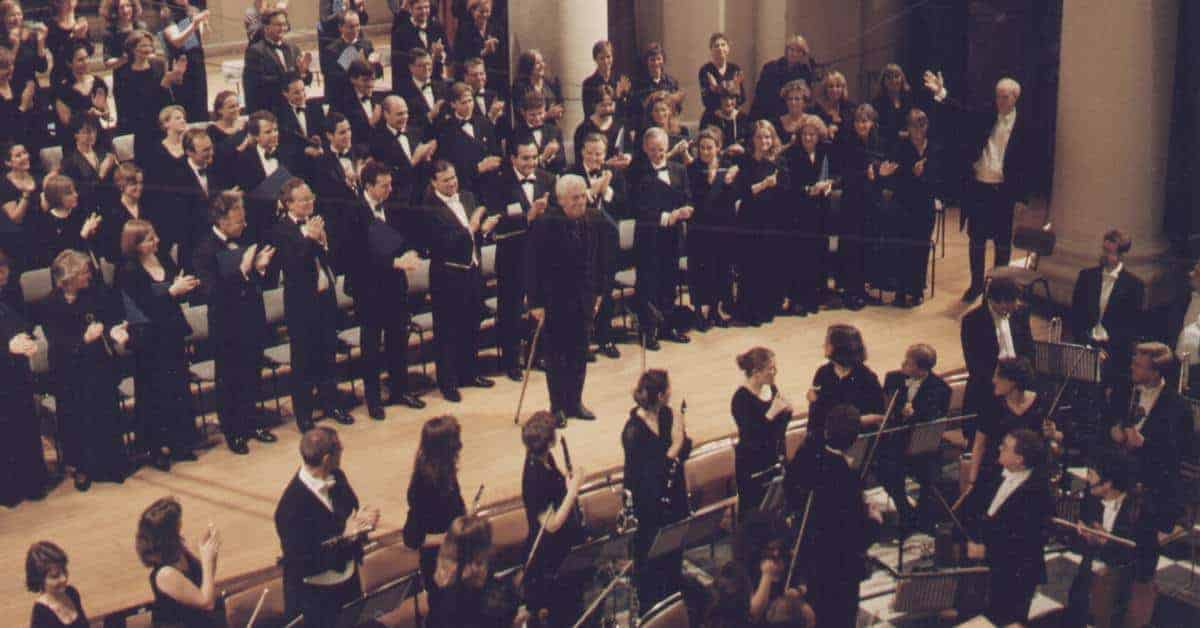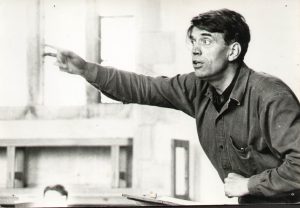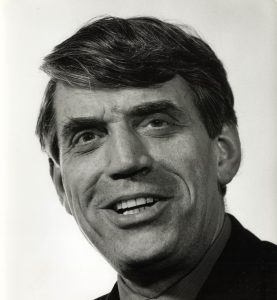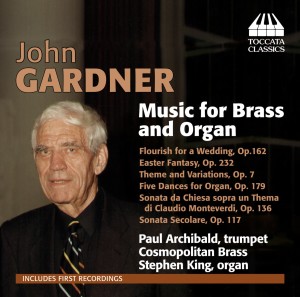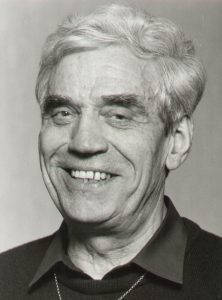This interview was published in Fanfare, Vol. 24, No. 1 (September/October 2000) to mark the release of an ASV CD of John Gardner’s orchestral music. In view of the approach of the John Gardner centenary on 2 March, to be marked by a centenary concert in Cadogan Hall in central London, we reproduce it here, minimally altered.
Sixty-odd years is a long time to wait for a composer to wait for the first record dedicated entirely to his orchestral music; indeed, the medium itself has changed twice in the meantime, and is about to undergo a third transformation. But even if the recording world has been slow to catch up with John Gardner’s extraordinary compositional energy, you might be familiar with his name nonetheless if you are a choral singer or, indeed, a Minneapolitan. Gardner is everything the TV-trained American might expect of an Englishman, even an English aristocrat: The diction absolutely precise, the voice deep and gravelly, the manner courteous but direct, with just a touch of professorial absent-mindedness to add colour. And, apart from brilliant white hair and the walking stick necessitated by a gammy leg, there’s nothing about him to suggest an 83-year-old – the sense of fun and his evident enjoyment of life betoken a much younger chap, and the physique hints at a life of adventure. The CD that has just emerged from ASV – with Gardner’s Third Symphony, Flute Concerto, Prelude for Strings, Sinfonia piccola for strings, Half Holiday Overture, and Irish Suite – on CD WHL 2125 gives us a chance to catch up with a composer whose music ought to be much better known: For those who like listening tips, there is something of Arnold, Shostakovich, Mahler, Barber, et qui sais-je encore in Gardner’s music, all welded into a style that is very much his own. By the way, Baker’s mistakenly dates the Sinfonia piccola as originating in 1974; in fact, it was written in 1960, nor is it one of the sequence of three numbered symphonies, on which a perceptive essay, by Paul Conway, can be found online; there’s also a more general biographical outline by David Wright.
Gardner was born in Manchester, on 2 March 1917, and grew up in Devon, in the English West Country. ‘I studied music at school, at Wellington College and at Oxford University, where I was the organ scholar of Exeter College. That’s about all. I wasn’t very well taught, and I didn’t have any composition teachers – I sometimes feel it would have been better if I had, but there it is.’ But I see in Baker’s Dictionary that he was taught by some distinguished men: Sir Hugh Allen, Ernest Walker, R. O. Morris and Thomas Armstrong. ‘Well, they gave me lessons, yes, but they weren’t lessons in composition. It was how to pass B. Mus. Exams – that’s what the lessons were in; they weren’t really in music. Also T. W. Adorno was influential: I was a friend of his. I didn’t have lessons but I was always going through music with him at Oxford. As you know, now he’s a huge figure in contemporary philosophy. We played piano duets a lot and we talked about music. He was an advanced student at Oxford when I was an undergraduate. There are records of his own music around now – it’s awful! He was very good company, actually.’ And R. O. Morris, renowned pedagogue – what was he like as a man? ‘Dull. He set crosswords for The Times, but I only learned about that recently. He was a very good musical craftsman, but he was awfully bored by teaching me; he was always about to catch a train. So I just sort of went on. I’ve always been in music, except for the latter part of my RAF career, where I was a navigator. Before that I’d been a bandmaster and a dance-band pianist in the RAF, and I directed the music at Repton School in the first six months of the war, and went to Covent Garden immediately after the war. For six years [1946–52] I was a member of the music staff. I was a répétiteur and occasional conductor – very occasional, actually: I think I only conducted two operas for schoolchildren and also I was Constant Lambert’s assistant in The Faery Queen of Purcell in 1951, so I did two or three of them. Since then I’ve been freelancing, teaching in various places – and writing music.’ Gardner’s ‘various places’ include St Paul’s School, where Holst preceded him as a teacher, and the Royal Academy of Music, but we’ll let that go.
How old was Gardner when he started composing? ‘When I was very young: I’ve got a composition I wrote at the age of seven. It’s illiterate, but it still is an attempt at music. After the war I started again: My Op. 1 was in fact in the first year I was out of the Air Force, because I started numbering from then. Although I was nearly thirty, I felt very much that it was all new. But there are some pieces written before the war that possibly are still played or sung. I was one of the first composers ever to write scores for television: In 1937 I wrote two ballets and two cabaret songs for television. I don’t think they were any good, and I don’t suppose there would be a copy of them now, but it was the first time I had earned money writing music. That was an interesting experience. I got ten guineas for each of the ballets, and at that time, 20 guineas for the two was big money, I remember. And the songs I did for four guineas. All payment was in guineas, which the readers of Fanfare won’t know – this arcane English sum of 21 shillings [a little under two dollars [– in 2000 terms! MA, 2017]].’
Gardner has been an enormously productive composer: There must be close on 250 opus numbers in his catalogue. ‘Nearly that: I think it’s probably 240. Of course, I had a great deal of pieces [before the new Op. 1] which haven’t been destroyed but they’re not being performed. They’re stacked at home; I haven’t thrown them away, but they’re not worth performing. Except that there’s a little choral piece – The Holy Son of God Most High – which was published, though no copies will exist now. I think it was burned in an air raid in the war. And it might be done occasionally still, if some churches have copies. I don’t know because no royalties reach me now: I sold it, for five quid. And five quid was not contemptible money before the war. You multiply by 50, I think, to get roughly the pre-war money.’
What was it that launched his career as composer? ‘It took off because Barbirolli did my First Symphony at Cheltenham in 1951. I started writing it when I was demobilised, and I finished it when I was about thirty years old; and about four years later Barbirolli did it. And since then I’ve had performances and commissions; I don’t think I’ve been without a commission since then. You can’t live on commissions – not for the sort of fees I got – but I was always being paid to write a bit of music. And occasionally, of course, when you write a bit of music and it gets performed, you get money for the performances.’
Was that First Symphony also Gardner’s first large-scale orchestral piece? It was Op. 2 in the new numbering, but had he cut his orchestral teeth earlier? ‘There were some variations for orchestra I wrote which were never performed. I wrote them just before the war, and finished them during the war. But they’re out of the list, so it was, really; you could say that.’ There’s a sense of movement, of momentum in the First Symphony that makes it difficult to believe that this is the first full-scale orchestral work of a man who had had no formal instruction. ‘Well, I was a very good musician; I was a very good score-reader. I learned about orchestration simply through playing scores at the piano. I’m not so good at it now, I find, but I was very good at that. I just knew what happened in music. That gave me my instinct for orchestration – though looking at the score of that now I would change quite a few bits. But it’s not bad, and it had a very good performance not so long ago, better than any it’s had. During its first years, after 1951, it had about twenty to thirty performances, everywhere – many times at the BBC, London, Manchester, Liverpool, Montreal, Australia, New Zealand. It’s never been done on the Continent; I don’t think it would go down well there!’ It strikes me as very English in its sound, if not in its manner. ‘That’s very interesting. Well, I suppose I am a very English person. I’m not mad about the “English school”, though, as such: Howells, Vaughan Williams, Finzi –that’s not really my music.’ What of the alternative school, the symphonic momentum of Rubbra and Simpson? ‘Yes, maybe. I don’t know Simpson, though Rubbra I know. I rather like Rubbra’s music, particularly the choral Inscape. And Walton I was mad about when I was young. But I’m not so mad now, and I detest a lot of his music now. But the Viola Concerto, which I heard about a year ago – I thought, what a marvellous piece it was, extraordinary. Britten has influenced me. Although he’s so successful, so much “there”, that people hardly bother to mention him; that’s an astonishing genius, that, without a doubt.’
Did the commissions he obtained pitch him into particular company? He has already mentioned Constant Lambert, for example. ‘I worked with Lambert at Covent Garden simply because he was on the staff of Covent Garden and I was. No, the commissions I got after the First Symphony were for the opera The Moon and Sixpence at Sadler’s Wells [1957], the ballet Reflections at Edinburgh [1952], and a work for the Three Choirs Festival, Cantiones Sacrae [also 1952] – not a very original name. Large-scale, seven movements. It’s a very difficult work, too difficult. My music suffered for quite a time by being very difficult. I think it’s easier now – I’ve learned that lesson. It’s no good writing difficult music unless you are going to have marvellous conductors and lots of rehearsal. In my Burns Sequence, my last work for choir and orchestra, which has been very successful, I really wrote very practical music there for the choir. I am a choir man: I always ran amateur choirs. I just knew what singers could sing. But when I got a commission, I thought: “This is being sung by a professional choir so I don’t think of my own singers”. And that’s a lesson it took me a long time to learn. I think I am probably a choral composer more than anything, really. I ran my own choir, and I’ve done a lot of summer schools and things, running choirs. I don’t do it any more now, but I think I was rather good at making people sing, and I rather like the act of singing myself.’
That enthusiasm is reflected in Gardner’s large output of choral music. ‘Yes, I’ve done an awful lot. For America, for instance – I have a big connection with Plymouth Church in Minneapolis: I’ve written many works for them. And also other things for musicians in Minneapolis, which must be one of the most musical cities in the States – I think because it’s rather a bleak place itself, it thrives on culture. What I’m doing at the moment is for Minneapolis, because they commissioned a set of songs in memory of my wife, who died two years ago. They’re really complete now; I have to sort of rewrite them a bit.’ These are choral songs, then? ‘No, no, solo songs, a song-cycle, seven songs, with piano. I like very much the solo voice. There’s a very good soprano singer there called Maria Jette, and I’ve written quite a bit of stuff for her. They’ve done quite a lot of my songs with piano there; they haven’t done any of my orchestral music, but they’ve done my Mass in D [1983], for instance, which is for chorus and orchestra. They do a lot of pieces there, because there’s this very good man there, Philip Brunelle, who runs the music of the Church; he’s a live wire. But there are lots of other people round there I know now, so I’ve written a lot of work for them. The bulk of my commissions in the last seven or eight years have been for Minneapolis.’
Those interested in exploring Gardner’s choral music will want to know that the London Oriana Choir has just released a CD (LOC 2/99) which includes his Seven Songs, choral settings of Shakespeare, Herrick, et al.—available directly from the Choir at www.loc.freeuk.com.
How did things begin to evolve after the Cantiones Sacrae? ‘I was a long time writing the opera: that really ate me for a year or two. Then I wrote a whole lot of large-scale works for choir and orchestra, with soloists and lasting half-an-hour, 45 minutes: The Ballad of the White Horse [1959] the Herrick Cantata [1961] which was written for Birmingham. Then for the Shakespeare quatercentenary I wrote a thing called Noble Heart; that was for Birmingham. And then a whole lot of little pieces, dozens, hundreds. I counted the other day that I’ve got about 50 octavo sheets (they call them leaflets now). Now that photocopying is so easy, publishers don’t print things in big stocks but they’ll always reprint them for you. At one time things went out of print and they just died. Music publishing is really finishing, isn’t it? My publishing was done by my wife, on Sibelius, which I can’t operate, but for the last two years of her life she did all my music as I wrote it. Publishers almost became otiose, because they weren’t any good at selling music and they took a long time to bring it out. My Second Oboe Sonata – OUP took twelve years to bring that out. So it’s all changing now, just as the art of music is going to change, isn’t it? There’s going to be a huge change.’ What sort of change does he mean? ‘I don’t know, and I’m not prepared to foretell it. But symphony concerts aren’t selling now, are they? Everything is on CD now; I realise now that music is really CDs in a sense. I don’t know that that means that people listen to them very intently, but they put them on: “Oh, that’s alright, quite like that!”. It’s a very interesting state of affairs.’
Time to turn to the new CD itself and the contrapuntal riches recorded thereon – first, the Third Symphony of 1989, a relaxed but involving blend of Shostakovichian mystery and English pastoralism. ‘You really hear English pastoralism in it? That’s interesting. I’m obsessed with formal contrivances, I think: I am crossword-puzzle fan, for example.’ Contrivances like the passacaglia in the Sinfonia Piccola, for example? ‘Yes, that’s right. My most contrived work is my Fantasy and Fugue on a Prelude of Anton Bruckner, which has every trick in the book – it’s a massive organ work which lasts about twenty minutes. Catherine Ennis has made a CD of it. I don’t suppose I’ll do anything like that again, but I do enjoy that side to music. I’ve written pieces for the millennial conference of the British Medical Association which are going to be played as the doctors file in and go out, and they’ve made a record of these two pieces, and they’re issuing it at this conference hoping that one or two doctors will buy it.’ (Gardner’s BMA commission – Intrada and Finale – also feature on Catherine Ennis’ new CD, as which as the Bruckner piece, his Five Dances, “which have been played quite a lot but they’re not published” [they’re now on Toccata Classics TOCC0048], his Organ Sonata, and his Five Hymn-Tune Preludes. Ennis, by the way, confirms Gardner’s words on the ‘contrived’ nature of the Fantasy and Fugue on a Prelude of Anton Bruckner: Though she is one of Britain’s leading organists, she still found it ‘one of the most difficult pieces of organ music I’ve ever had to play’.)
Anyway, back to the Third Symphony. ‘It’s immensely classical…. Well, it isn’t really, I suppose. It’s very difficult to talk about it. The first movement is intensely thematic, everything about it is thematic. There’s a relaxation from that in the slow movement, but in the last movement, again intensely thematic: I derive everything. The music is very contrapuntal, which has always fascinated me. I’m rather a good contrapuntist, I think. [He’s right!] Perhaps it’s all rather different now that I am in my eighties, but I am fascinated by that. That and jazz are the two best things in music! Jazz is my great hobby. I am not a jazz musician, but I am a connoisseur of it, and I understand it, though unfortunately I can’t do it. But I have tried. I think that’s finished: I don’t like the jazz that goes on now. My sort of jazz time is really Bill Evans. In the way that Chopin fixed the harmony for serious music in the nineteenth century – and he did really fix it: It enabled Wagner to write music – Bill Evans set the harmony for jazz in the mid-century. I stop there: I can’t move on from that. You can’t go on evolving: You have to stay somewhere.’
There’s nothing of the world of jazz on this new disc, though. ‘No, no, I keep it really separate, because I am not a jazz musician. There’s a tiny bit of show music in the overture [Half Holiday, 1962], actually, which is the most elaborate piece of thematic construction I’ve ever done – because it’s light music. And I hate light music because it has no care for what I really regard as important in music. I’m very proud of that overture because people think it’s just tuneful. Well, it is, but it is actually thematically constructed, every note of it. But I don’t want people to know that: this is a secret which is only of interest to a certain number of musicians.’ Someone coming to Half Holiday with no previous experience of Gardner’s music might find the soundworld close to that of Malcolm Arnold; is that a useful pointer? ‘I am a great admirer of Arnold and I don’t doubt he has influenced me here and there, but he hasn’t influenced Half Holiday. Because I perhaps don’t feel quite like he does, it’s difficult for me to write music like that. But I like his symphonies very much. Not all of them, but the Second is particularly good.’ Gardner, surely, has a more highly developed sense of harmony than Arnold. ‘Well, of course, I have to work much harder than he does. He just sat down and wrote music like that. I have to work at music, and it gets more difficult the older I get: I find it quite difficult now. I used to be able to write quite fast when I got going, or I couldn’t have written so much music.’
There’s a real tear-jerker on the new disc in the form of the Mahlerian Prelude for Strings, which I see from the notes is an adaptation of music from his Third String Quartet of 1978. ‘It’s just what the string quartet plays only there are double-basses added; it’s not really an arrangement. There was a few more minutes and they asked me: ‘Have you got something else?’ And I suddenly thought of this movement of my string quartet – which everyone thinks the best track on the whole of that record now! I’m a bit annoyed about that, because I actually improvised that piece. As I say in the liner notes, it’s one of the few pieces which I actually wrote straight out on paper. I probably had to polish it a bit, but there’s no structural effort at all, it’s just an improvisation. And now all my friends tell me it’s the best piece on the record. Well, I don’t mind that – it’s something to have written. It’s a string quartet of 25 movements; it’s 45 minutes. That’s been performed. It cycles through all the keys from C to C, so the final prelude is a version of the first prelude.’ Is does it use a cycle of fifths? ‘No, I do it in the same way that Chopin does, which is not a very good way, because I’ve written 24 Ländler for piano since then and I’ve got a much better way of going through the 24 keys. You start in F sharp minor, you go down a major third, and then up a fourth – something like that. The Chopin key things are rather horrid: sometimes I just don’t like the next key that’s coming up – you have a very obvious one for two of the keys and then a jerk. They’re marvellous, the Chopin Preludes. I took his system because I couldn’t think of another one, but I have now for the Ländler, which haven’t been published; they’ve only been privately performed. I did a twelve-key piece once for Alan Bush, but I didn’t want to write 24 pieces, so I only wrote twelve.’
Is the Third Symphony, composed in 1989, his most recent work in the genre? ‘Oh yes, I haven’t written another one since then. The Second Symphony has had a few performances. I will say this: my three symphonies are different, which is something. It would be dreadful to solve the same problem three times; of course, there was a long gap. There’s no doubt that the First Symphony was the most successful one. In its first few years it was really being played quite a lot. Then it became an undesirable piece: It was a “Cheltenham” symphony. They were considered rather vulgar. I can see the point of that. Barbirolli had a great taste for live symphonies and he did hundreds of them, you know, by all sorts of composers.’
With luck the new CD will have enough success to encourage further recordings, so what others of his works would he particularly like to hear? ‘Obviously, I’ve written a lot of bad music and I wouldn’t like to hear that. The Second Oboe Sonata [1986] has just been recorded and that’s one of my best pieces (the First Oboe Sonata is one of my worst): George Caird has done that. And my Oboe Concerto [1990], which I think is rather a good piece, is being recorded next month. I have one best-seller, Tomorrow shall be my dancing day, which makes as much money as all the rest I have written put together. That’s had many recordings. It’s a work for choir, piano and percussion; it lasts one-and-a-half, two minutes. It’s done all over the States – if I meet any American person in a choir, they say: “Oh, I just love your Tomorrow shall be my dancing day, I was married to it!” It’s a great piece for weddings. It is rather a good piece, actually. I wrote it when I was at St Paul’s Girls’ School for the girls to sing there and I remember that I almost made it up when I was conducting a choir there. If it suddenly dries up and goes out of fashion, I shall be poorer, but with any luck I shall be gone before that happens!’
